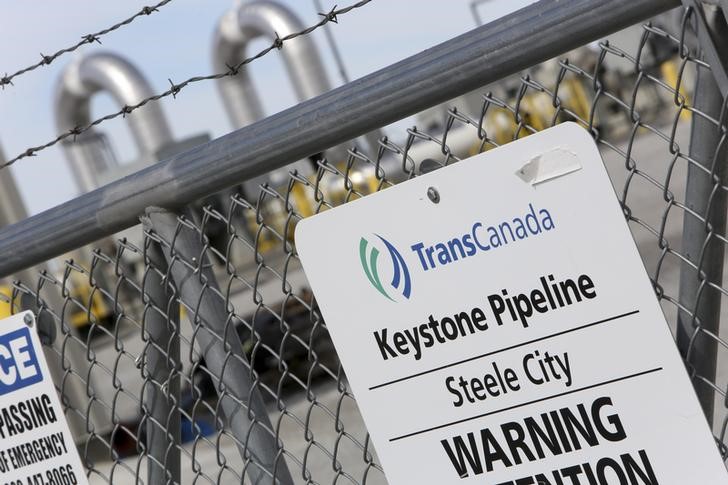By Valerie Volcovici and Ethan Lou
WASHINGTON/CALGARY, Aug 4 (Reuters) - Nebraska regulators weighing the fate of TransCanada Corp 's TRP.TO proposed Keystone XL pipeline have ruled that opponents of the project cannot use one of their best new arguments against it in final hearings next week: that America does not need the oil.
The state's five-member Public Service Commission is scheduled to hold court-like hearings on Aug. 7-11 before deciding whether to approve the project's route, marking the final hurdle for the long-delayed project after President Donald Trump gave it federal approval in March.
A judge this week notified some 25 landowners along the pipeline's proposed route that she would exclude some of their pre-written testimony, including arguments that there is a limited market need for it.
Lawyers for TransCanada had objected to the argument, telling the commission it is beyond the scope of its consideration, according to records seen by Reuters. commission is charged with weighing whether the project is in the public interest of Nebraskans, and will mainly consider things like jobs and revenues. The commission is barred from considering any environmental issues because the pipeline route already has an environmental permit.
The decision to block arguments relating to the business case for Keystone XL is a blow to pipeline opponents who had hoped to lean heavily on it after TransCanada Executive Vice President Paul Miller told investors last month the company has not yet decided if the pipeline will be built, and will wait until it makes "an assessment of commercial support." there is no demand for this route and investors are uninterested, it is not in the public interest," said Brian Jorde, one of the attorneys representing 90 landowners opposed to the Keystone XL proposed route.
'SEVERAL ALTERNATIVES'
Opponents of the project have for years argued the pipeline from Alberta's oil sands to the U.S. heartland poses a risk of spills, could accelerate global warming, and offers limited jobs and revenue in return.
TransCanada rejects that, saying the project can be run safely and would provide significant benefits to Nebraska in the form of construction jobs and property taxes.
Trump, who campaigned on a pledge to support the line after former President Barack Obama blocked it on environmental grounds, has said the project would create 28,000 jobs nationwide. A 2014 State Department study predicted just 3,900 construction jobs and 35 permanent jobs.
Since Miller's comments in July, TransCanada officials have reiterated their commitment to the project and said it has "good support" from shippers. The company is now seeking pledges from prospective shippers on the pipeline in the amount of 225,000 barrels per day.
TransCanada CEO Russell Girling said in the spring that lower oil prices and alternative export routes were complicating negotiations with Canadian producers for shipper commitment for Keystone XL.
Chief executives of Canada's major oil sands producers said they support the project in principle, but have been tight-lipped on whether they have committed any volumes.
Cenovus CEO Brian Ferguson said the company has "several alternatives" in terms of pipelines, and Suncor CEO Steve Williams said it supports pipeline projects in general but "it depends on what time they come into service."
<^^^^^^^^^^^^^^^^^^^^^^^^^^^^^^^^^^^^^^^^^^^^^^^^^^^^^^^^^^^ TransCanada's objections on testimony
TransCanada to make final decision on Keystone XL by December
(Writing by Richard Valdmanis; Editing by Lisa Shumaker and Mary Milliken)
